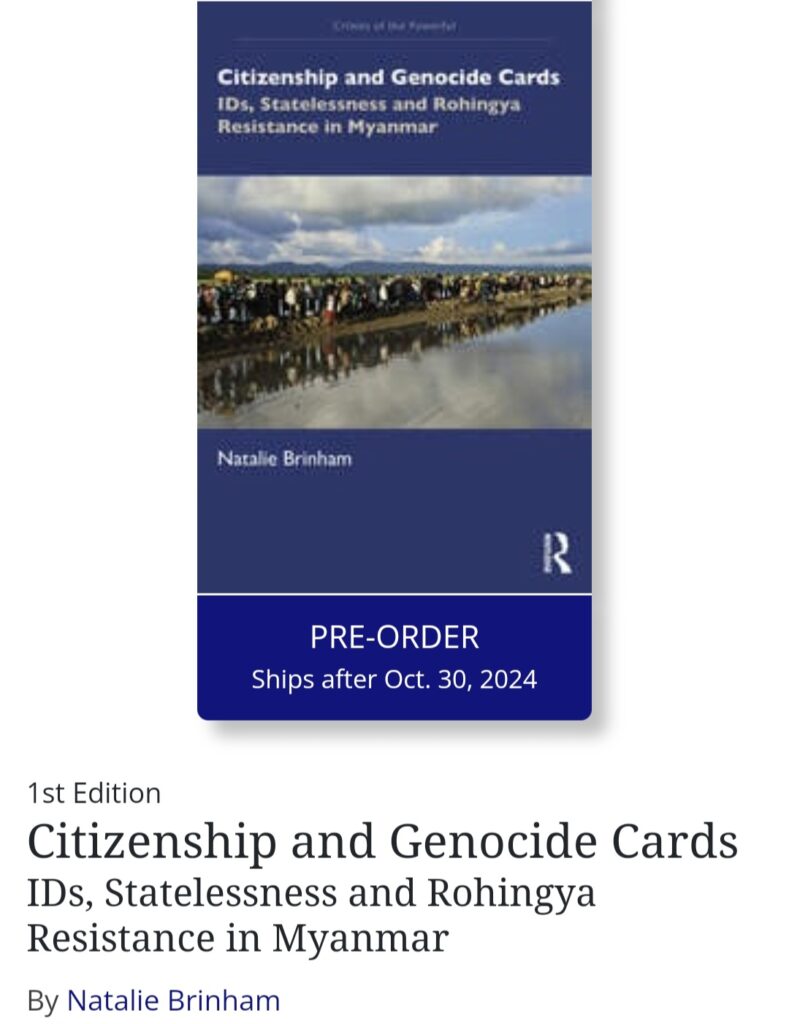Citizenship & Genocide Cards
ANNOUNCEMENTS, 14 Oct 2024
Natalie Brinham - TRANSCEND Media Service
Citizenship & Genocide Cards by Natalie Brinham, Routledge, 2024 (paperback, hardcopy or open access e-book)
This book draws on Rohingya oral histories and narratives about Myanmar’s genocide and ID schemes to critique prevailing international approaches to legal identities and statelessness. By centring the narratives of survivors of state crimes, collected in the aftermath of the 2017 genocidal violence, this book examines the multiple uses of state issued ID cards and registration documents in producing statelessness and facilitating genocide. In doing so, it challenges some of the international solutions put forward to resolve statelessness.
Rohingya narratives disrupt a simple linear understanding of documenting legal identity that marginalizes experiences of these processes. The richly layered accounts of the effects of citizenship laws and registration processes on the lives of Rohingya, problematise the ways in which international actors have endorsed state ID schemes and by-passed state-led persecution of the group. This book will be valuable for scholars studying global criminology, state crime, development studies, refugee and migration studies, statelessness and nationality, citizenship studies and genocide studies.
Table of Contents
- Introduction: IDs for Rohingya: ‘Pathways to Citizenship’ or ‘Instruments of Genocide’?
- Papers, Cards, and Perilous Encounters with the State: Identity documents, oral histories and state crime research
- By-passing State Power and Neutralising State Bureaucracies in International Approaches to Statelessness
- State Power and Identification Schemes in Rakhine: From the British colonial period to Burma’s independence
- IDs as Evidence of State Crime and Artefacts from the Early Decades of Independence
- Genocide and Identity Destruction in Rohingya ID Narratives
- ‘Genocide Cards’: IDs, Registration, and the Phases of Rohingya Genocide
- IDs and International Approaches to Rohingya Statelessness: Towards social inclusion or identity destruction?
- Conclusion: Seeing the State and Criminality in Statelessness.
Biography
Natalie Brinham is a member of the TRANSCEND Network for Peace Development Environment, a researcher and author working on statelessness, ID systems, forced migration and genocide. She also has many years of experience working in the UK and Southeast Asia in human rights, advocacy, and frontline provision for refugees and migrants. She holds a PhD in Legal Studies from Queen Mary University of London, and an MA in Gender, Education and International Development from University College London.
***********************
Critics’ Reviews
Learning from Rohingya people and experiences, this powerful book connects ID cards and genocide. It reframes citizenship, statehood and ID cards to hold to account, not just the Myanmar government but the international community.
— Bridget Anderson, Professor of Migration, Mobilities and Citizenship. University of Bristol, UK
This book examines the links between state registration procedures and mass violence. Foregrounding the voices of Rohingya survivors from Myanmar, it offers human rights advocates and policy makers an important critique and analysis to reflect upon when developing interventions around statelessness and the ‘legal identity for all’ international development agenda.
— Yanghee Lee, Professor Emeritus, Sungkyunkwan University & Former UN Special Rapporteur on the situation of human rights in Myanmar (2014 to 2020)
This book offers a brilliant and insightful analysis of how the experiences and understandings of the Rohingya diverge from those of the state and the international actors. This is a timely and extremely valuable contribution to the scholarship on statelessness. It is engaging, exciting and provocative.
— Ratna Kapur, Professor of International Law, Queen Mary University of London, UK
Myanmar’s misuse of the citizenship law and ID card system is at the heart of the Rohingya suffering and loss. When we tell the stories of our citizenship, our voices are often buried under piles of legalese and paperwork. This book calls for Rohingya knowledge and experience to be put at the forefront of international interventions; a vital read for those working on statelessness and genocide.
— Jaivet Ealom, CEO of Rohingya Centre of Canada and Author of “Escape from Manus”
***********************
If interested order here: https://www.routledge.com/Citizenship-and-Genocide-Cards-IDs-Statelessness-and-Rohingya-Resistance-in-Myanmar/Brinham/p/book/9781032799261 .
For open-access e-book click here: https://www.taylorfrancis.com/books/oa-mono/10.4324/9781003494539/citizenship-genocide-cards-natalie-brinham
Tags: Burma/Myanmar, Genocide, Literature, Reviews
This article originally appeared on Transcend Media Service (TMS) on 14 Oct 2024.
Anticopyright: Editorials and articles originated on TMS may be freely reprinted, disseminated, translated and used as background material, provided an acknowledgement and link to the source, TMS: Citizenship & Genocide Cards, is included. Thank you.
If you enjoyed this article, please donate to TMS to join the growing list of TMS Supporters.

This work is licensed under a CC BY-NC 4.0 License.
Join the discussion!
We welcome debate and dissent, but personal — ad hominem — attacks (on authors, other users or any individual), abuse and defamatory language will not be tolerated. Nor will we tolerate attempts to deliberately disrupt discussions. We aim to maintain an inviting space to focus on intelligent interactions and debates.
